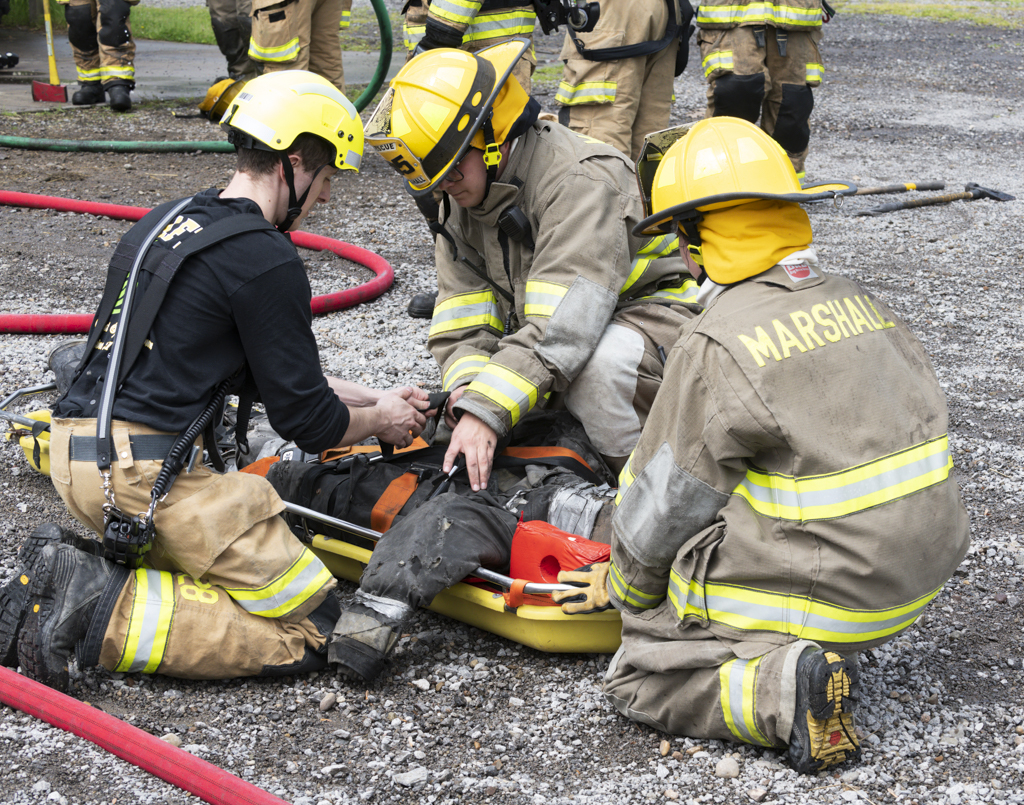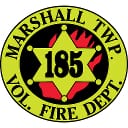How to Become a Volunteer Firefighter
Some of the material on this page is reproduced from “Steps” – Student Training & Education in Public Service. It provides general information to anyone interested in becoming a volunteer firefighter in their local community. Nationally, there is a critical shortage of firefighters and MTVFD is no different. Please note that the information provided here is generic. For specific information about Marshall Volunteer Fire Department requirements, benefits and instructions on how to apply to MTVFD, please visit the Membership Application page on this website.
Becoming a volunteer firefighter is one of the most rewarding and selfless decisions you can make. Volunteer firefighters prevent and put out fires and administer first aid within their communities. Today, volunteers make up 55% of all active firefighters, making it a great first step on the ladder to becoming a paid firefighter. Keep reading to learn what it takes to fill this vital role and find out how you can get started making a difference today.
Understand the duties of a volunteer firefighter.
The duties of a volunteer firefighter span beyond putting out fires and rescuing animals from trees. In reality, volunteer firefighters perform a multitude of important tasks to keep others safe, maintain their equipment, and ensure the department can continue serving their community. Some of the most common duties include:
- Fire Emergencies – Volunteer firefighters respond to fire outbreaks in the same way as paid firefighters. Some responsibilities include setting up ladders, connecting hoses to hydrants, spraying fires directly, and using methods to prevent fire spread.
- Emergency Medical Services – Volunteer firefighters often administer first aid or CPR to individuals hurt in fire, accidents, or other types of emergencies. Individual training ranges from basic to advanced.
- Search and Rescue – When an individual or group of people go missing or are in imminent danger, volunteers may participate in search and rescue efforts. These may take place in bodies of water, remote spaces, mountainous areas, or even urban settings. Volunteers usually work in teams to cover larger areas of ground in shorter amounts of time.
- Traffic Accidents and Traffic Incident Management – Many volunteer firefighters are trained in vehicle rescue to extract victims after a crash. Others perform traffic control.
- Vehicle and Equipment Maintenance – Some firefighters sometimes work to repair equipment, uniforms, or vehicles. Given the high levels of wear and tear that comes with this type of work, it’s not unusual for frequently used tools to require maintenance.
- Administrative Duties – These duties are wide ranging may range from accounting to clerical duties ti website development and everything in between. These functions may be performed by firefighters or, in many cases, non firefighter individuals who are members of the department and, like firefighters, are 100% volunteer.
Understand the benefits of becoming a volunteer firefighter
- A Second Family – When working in life or death situations, those who serve alongside you can become more than colleagues, they become family. In addition to your work as a volunteer firefighter that bonds you together, you will also likely go through personal and professional changes that you share with your fellow volunteers.
- Free Training and Professional Development – Individuals who have never taken a safety class before can get all the training they need by becoming a volunteer firefighter. Often the department will pay for EMT, CPR, and basic life-saving training. Some also set aside funding for attending local and regional firefighter conferences.
- Tax Incentives – Some states and local municipalities allow firefighters to receive tax credits.
- Scholarships – Funding may be available through local departments and other agencies to help offset tuition costs.
Most importantly, you have the knowledge that you are providing a critcal service to your community
Are you ready to become a volunteer firefighter?
- Are you willing to give up the occasional full night of rest or work unsocial hours to help others?
- Do you find it important to give back to the community in meaningful ways that pay it forward?
- Do you feel your mental health is robust and that you can perform responsibilities without experiencing undue stress and/or anxiety?
- Are you looking for a community of others who enjoy helping people in times of fear or loss?
- Do you meet all of the general and specific requirements for becoming a volunteer firefighter?
Contact your local fire department.
One of the first – and most important – things you learn about being a volunteer firefighter is that you can’t go it alone. Researching what volunteering entails and how you can get started is a great place to begin, but getting in touch with your local fire department is the best way to find out all the specifics. Try speaking with the fire chief or the volunteer coordinator and ask about current and future openings with the department. Some of the questions you may want to ask include:
- Are there residency restrictions?
- What’s involved in the screening process?
- Does the fire department have vacancy? For volunteer fire departments, the answer is almost always “YES”.
- How many hours do volunteers work on average?
- Does the department provide fire safety equipment or do I?
To apply for membership in the Marshall Township Volunteer Fire Department,
visit the Membership Application page on this website.
Additional Information


